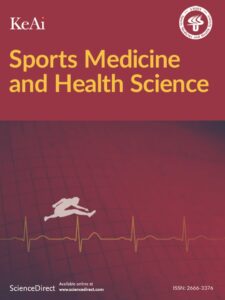Publications

Effect of percussive massage treatment and static stretching on muscle tone, stiffness, and strength recovery after exercise-induced muscle fatigue: A randomized controlled study
Authors: Gangrui Chen 1, Zhongke Gu 2, Dongling Xin 2, Yuxuan Qi 3, Jiansong Dai 2
Affiliations:
- Sport Science Research Institute, Nanjing Sports Institute, Nanjing 210014 China
- Department of Sports and Health Science, Nanjing Sports Institute, Nanjing 210014 China
- School of Physical Education, Performance and Sport Leadership, Springfield College, Mass, USA
Journal: Sports Medicine and Health Science - March 2025, In Press, Journal Pre-proof (DOI: 10.1016/j.smhs.2025.03.007)
-
Field & Applications:
- Sport
- Treatment evaluation
- Warm-up / Recovery
- Fatigue / Overtraining
The aim of this study was to compare the effects of percussive massage treatment and static stretching on muscle tone, stiffness, and strength recovery following exercise fatigue. Sixty subjects were randomly divided into three groups: a control group (CG, n = 20), a static stretching group (SSG, n = 20), and a percussive massage treatment group (PMTG, n = 20). Following exercise-induced muscle fatigue, interventions were applied, including supine rest, static stretching, and percussive massage treatment. Muscle tone, stiffness, and muscle strength indicators were assessed at five time points: before the exercise (Pre-exercise), immediately after exercise (Post-exercise), immediately after therapy intervention (Post-0), 24 hours (h) after therapy intervention (Post-24h), and 48 h after therapy intervention (Post-48h).
Results: At Post-0, muscle tone and stiffness in both the control group and static stretching group were significantly higher than Pre-exercise, while in the percussive massage treatment group, there were no statistically significant differences compared to Pre-exercise. At Post-48h, peak torque in the control group was significantly lower than Pre-exercise. In contrast, the percussive massage treatment group and static stretching group showed no significant differences at Post-48h compared to Pre-exercise. These findings indicated that percussive massage therapy is immediately effective in mitigating muscle tone and stiffness after exercise fatigue, whereas static stretching and percussive massage therapy facilitate the recovery of muscle strength within 48 h.
Keywords: percussive massage therapy, static stretching, muscle tone and stiffness, muscle strength
High-intensity exercise-induced muscle fatigue requires at least 24 h for muscle status recovery and at least 48 h for muscle strength recovery without any intervention. Percussive massage therapy effectively and rapidly reduces muscle tone and hardness after exercise-induced fatigue, whereas percussive massage therapy and static stretching effectively promote the rapid recovery of muscle strength within 48 h. PMT during inter-match intervals is recommended for athletes participating in multiple matches within a single day or over consecutive days to relax the muscles and reduce muscle stiffness and tone. After the competition, SS or PMT can be used for facilitating muscle relaxation and promoting the recovery of muscular strength.


